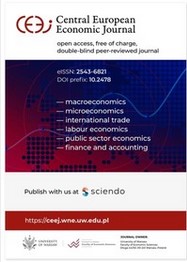The Role of Energy in a Real Business Cycle Model with an Endogenous Capital Utilization Rate in a Government Sector: Lessons from Bulgaria (1999–2016)
The Role of Energy in a Real Business Cycle Model with an Endogenous Capital Utilization Rate in a Government Sector: Lessons from Bulgaria (1999–2016)
Author(s): Aleksandar VasilevSubject(s): Business Economy / Management, Energy and Environmental Studies, Economic policy, Environmental and Energy policy, Government/Political systems, Transformation Period (1990 - 2010), Present Times (2010 - today)
Published by: Wydawnictwa Uniwersytetu Warszawskiego
Keywords: business fluctuations; capital utilization rate; endogenous depreciation rate; energy use; energy prices; Bulgaria;
Summary/Abstract: We introduce a pro-cyclical endogenous utilization rate of physical capital stock into a real business cycle model augmented with a government sector in detail. We calibrate the model to Bulgarian data for the period following the introduction of the currency board arrangement (1999–2016). We investigate the quantitative importance of the endogenous depreciation rate and the capital utilization mechanism working through the use of energy for cyclical fluctuations in Bulgaria. In particular, a positive shock to energy prices in the model works like a negative technological shock. Allowing for variations in factor utilization and the presence of energy as a factor of production improves the model performance against data, and in addition this extended setup dominates the standard RBC model framework with constant depreciation and a fixed utilization rate of physical capital (e.g., Vasilev (2009)).
Journal: Central European Economic Journal
- Issue Year: 5/2018
- Issue No: 52
- Page Range: 130-141
- Page Count: 12
- Language: English

